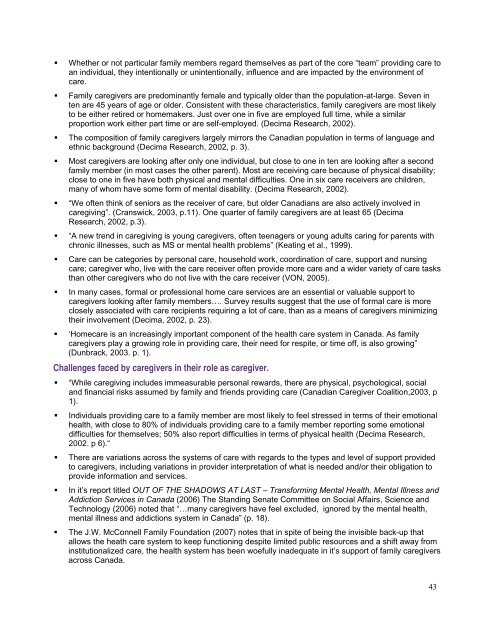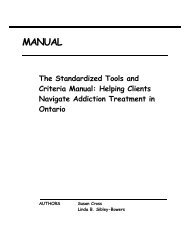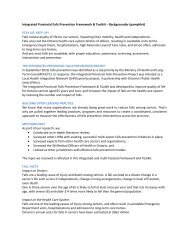Caregiver Support and Well-Being Priority Project - Central East ...
Caregiver Support and Well-Being Priority Project - Central East ...
Caregiver Support and Well-Being Priority Project - Central East ...
You also want an ePaper? Increase the reach of your titles
YUMPU automatically turns print PDFs into web optimized ePapers that Google loves.
• Whether or not particular family members regard themselves as part of the core “team” providing care toan individual, they intentionally or unintentionally, influence <strong>and</strong> are impacted by the environment ofcare.• Family caregivers are predominantly female <strong>and</strong> typically older than the population-at-large. Seven inten are 45 years of age or older. Consistent with these characteristics, family caregivers are most likelyto be either retired or homemakers. Just over one in five are employed full time, while a similarproportion work either part time or are self-employed. (Decima Research, 2002).• The composition of family caregivers largely mirrors the Canadian population in terms of language <strong>and</strong>ethnic background (Decima Research, 2002, p. 3).• Most caregivers are looking after only one individual, but close to one in ten are looking after a secondfamily member (in most cases the other parent). Most are receiving care because of physical disability;close to one in five have both physical <strong>and</strong> mental difficulties. One in six care receivers are children,many of whom have some form of mental disability. (Decima Research, 2002).• “We often think of seniors as the receiver of care, but older Canadians are also actively involved incaregiving”. (Cranswick, 2003, p.11). One quarter of family caregivers are at least 65 (DecimaResearch, 2002, p.3).• “A new trend in caregiving is young caregivers, often teenagers or young adults caring for parents withchronic illnesses, such as MS or mental health problems” (Keating et al., 1999).• Care can be categories by personal care, household work, coordination of care, support <strong>and</strong> nursingcare; caregiver who, live with the care receiver often provide more care <strong>and</strong> a wider variety of care tasksthan other caregivers who do not live with the care receiver (VON, 2005).• In many cases, formal or professional home care services are an essential or valuable support tocaregivers looking after family members…. Survey results suggest that the use of formal care is moreclosely associated with care recipients requiring a lot of care, than as a means of caregivers minimizingtheir involvement (Decima, 2002, p. 23).• ‘Homecare is an increasingly important component of the health care system in Canada. As familycaregivers play a growing role in providing care, their need for respite, or time off, is also growing”(Dunbrack, 2003. p. 1).Challenges faced by caregivers in their role as caregiver.• “While caregiving includes immeasurable personal rewards, there are physical, psychological, social<strong>and</strong> financial risks assumed by family <strong>and</strong> friends providing care (Canadian <strong>Caregiver</strong> Coalition,2003, p1).• Individuals providing care to a family member are most likely to feel stressed in terms of their emotionalhealth, with close to 80% of individuals providing care to a family member reporting some emotionaldifficulties for themselves; 50% also report difficulties in terms of physical health (Decima Research,2002. p 6).“• There are variations across the systems of care with regards to the types <strong>and</strong> level of support providedto caregivers, including variations in provider interpretation of what is needed <strong>and</strong>/or their obligation toprovide information <strong>and</strong> services.• In it’s report titled OUT OF THE SHADOWS AT LAST – Transforming Mental Health, Mental Illness <strong>and</strong>Addiction Services in Canada (2006) The St<strong>and</strong>ing Senate Committee on Social Affairs, Science <strong>and</strong>Technology (2006) noted that “…many caregivers have feel excluded, ignored by the mental health,mental illness <strong>and</strong> addictions system in Canada” (p. 18).• The J.W. McConnell Family Foundation (2007) notes that in spite of being the invisible back-up thatallows the heath care system to keep functioning despite limited public resources <strong>and</strong> a shift away frominstitutionalized care, the health system has been woefully inadequate in it’s support of family caregiversacross Canada.43
















